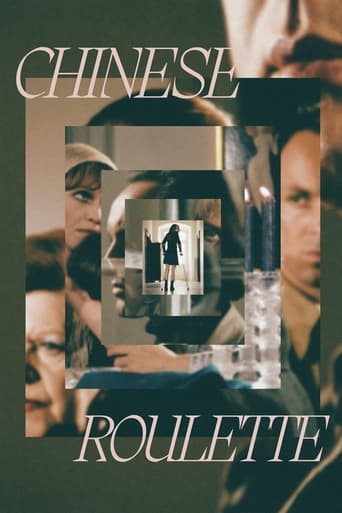Horst in Translation ([email protected])
"Chinesisches Rouelette" or "Chinese Roulette" is a West German color film from 1976, so this one has its 40th anniversary this year. The writer and director is Rainer Werner Fassbinder and he was 30 when he shot this movie less than 100 years before his untimely death. It is a bit of an unusual film for him as the character in here is a girl (on crutches) and usually his protagonists were female grown-up women. Of course, there are also grown-ups in here. Also the movie stays easily under 90 minutes, which is also not too common for Fassbinder films. Carstensen, Mira, Lommel and Spengler are all actors that worked with Fassbinder on a regular basis and they have a couple good scene s in here too. I also somewhat liked the premise of everybody playing Chinese Roulette here, but sadly it really takes quite a while until they finally do and everything before that simply is not very interesting. I struggled a bit with the characters in general. Of course, it's rarely the case that there are likable characters in Fassbinder films, but I also cared for hardly anybody in here, maybe only the girl. As a whole, I must say I was glad this film was over fairly quickly as I felt the negative outweighed the positive. It's not one of Fassbinder's best or worst, but I would not really recommend the watch. Thumbs down.
sol-
Believing that her parents' longtime extramarital affairs caused her physical ailments, a teenage cripple arranges for both sets of adulterers to unexpectedly meet at a country home in this Rainer Werner Fassbinder thriller. The film is gloriously photographed by Michael Ballhaus, with the camera giddily spinning around to reflect nervousness when the four adulterers first meet, and the very deliberate framing (some actors turned to faced the camera; others not) throughout adds tension. The juice of the film comes from both the girl's initially elusive motives and the sense of emotions about to explode; at one point, her own mother almost shoots her through an open window. Oddly, the film never explores why the daughter has more hostility towards her mother (and vice versa) than her father, but this aside, the only significantly underwhelming aspect of the film is the title game. Nowhere near as dangerous as Russian roulette on the surface, Chinese roulette -- a game that seems to only exist in the film's universe -- is merely a guessing game of sorts, albeit one in which deep resentment is able to surface. Whatever the case, the film is a surprisingly tense ride considering the minimal sets and small cast. It also offers food for thought in terms of who is to blame and whether indeed the girl's parents brought the situation upon themselves through emotionally (if maybe not physically) injuring their daughter.
m67165
This film is intense. I found it quite entertaining as a psychological thriller. You wonder how far will these people go into the game. Will anyone break? Will the violence become physical? It kept my interest to the very ending, which was a good one.
zetes
Like most Fassbinder films, it's seemingly simple, but there's a lot too it when you walk a bit closer. This one sets up a great tragicomic situation: a disabled teenager manipulates her parents each to bring their lover to their summer mansion for the weekend. When the father arrives with his lover (Anna Karina, in a very quiet role), he finds his wife pinned to the floor by her boy toy. A bit later the daughter arrives with her caretaker (and possibly her lover?) who is deaf and mute. Mrs. Kast and her blonde son, Gabriel, take care of the mansion, cook, and so forth. Kast is played by Brigitte Mira, who was so wonderful two years earlier in Fassbinder's Fear Eats the Soul. She's a lot more cruel in this one.With the situation as it is, their true characters quickly rise to the surface. The parents get the most time; father is loving in his way, but his love is probably only a result of the guilty feelings he has towards his daughter. Mother, on the other hand, is quite the psycho. At one point, as she sees her daughter lumbering along on her crutches from a second story window, she picks up a pistol and aims it at her daughter's back. She uses no euphemisms: her daughter, she believes, has ruined her life.
Fassbinder's direction is exquisite. His framing is so complex, but it's invented to look simple. The simple set might be called stagey by those who are not paying enough attention. When the four lovers meet, Fassbinder circles the camera around them as they pace around each other, creating a dizzying dance. Peer Raben's gorgeous and unique music also should be pointed out.Not everything works out perfectly. The titular game is an interesting idea to do on film. The eight characters split into two groups, the first picks a person in the house and the second has to guess after they've asked a certain number of questions. I think Fassbinder has a difficult time making the questions and answers meaningful for the film as a whole. These exchanges get a little ponderous as a result, and the only thing that keeps the sequence alive is Raben's score. Like I said, it was quite a daring thing to do, so the fact that it doesn't work out perfectly doesn't harm the film too much. 9/10.



